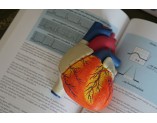Alzheimer's Disease
Alzheimer's disease affects millions of adults and their loved ones every day. In most people with Alzheimer’s, symptoms first appear after age 65. It is estimated that over 5 million Americans age 65 and older suffer from Alzheimer’s disease.
What is Alzheimer’s disease?
 Alzheimer’s disease is a progressive brain disease that gradually destroys memory and reasoning skills. The most common early symptoms include problems with verbal communication, confusion, behavioral and emotional problems and short-term memory loss.
Alzheimer’s disease is a progressive brain disease that gradually destroys memory and reasoning skills. The most common early symptoms include problems with verbal communication, confusion, behavioral and emotional problems and short-term memory loss.
As the disease advances, the capacity to carry out the simplest tasks becomes more difficult and eventually leads to loss of bodily functions and ultimately death. Although the rate of progression can vary, the average life expectancy following diagnosis is three to nine years.
Alzheimer’s ranges in severity from the mildest stage, when it is just beginning to affect a person’s cognitive skills, to the most severe stage, when the person must depend completely on others for basic care.
Alzheimer's disease accounts for 60 to 80 percent of dementia cases.
What is dementia?
Alzheimer's is the most common type of dementia, a general term for memory loss serious enough to affect a person's ability to perform everyday activities. Dementia is not a specific disease. It's a universal term that describes a broad range of symptoms associated with the degeneration of memory and related cognitive functions.
Dementia is often inaccurately referred to as "senility," which specifies the once widespread but incorrect belief that serious mental decline is a normal part of aging.
How Are They Different?
When someone is diagnosed with dementia, they are being diagnosed with a specific group of symptoms. This is comparable to a person who has a stomach ache. Their stomach hurts but it is not known what is causing the actual symptom. It could be food poisoning, stomach flu or indigestion. Likewise, when a person has dementia they are suffering from symptoms without being informed of the cause of the symptoms.
Another main difference between the two is that Alzheimer’s is a degenerative and incurable disease, while there are some forms of dementia that are treatable.
Once a cause of dementia is diagnosed, the appropriate steps and treatment can begin.
Types of dementia
There are many other conditions which can cause dementia, which is why it is vital for patients to obtain an accurate diagnosis early on in order to get proper treatment. The following are some of the most common types of dementia and their causes.
- Vascular Dementia
- Mixed Dementia
- Dementia with Lewy Body Disease (DLB)
- Parkinson's Disease Dementia (PDD)
- Frontotemporal Dementia
- Creutzfeldt-Jacob Dementia (CJD)
- Normal Pressure Hydrocephalus (NPH)
- Huntington's Disease
- Wernicke-Korsakoff Syndrome
- Mild Cognitive Impairment (MCI)
Early signs and symptoms
- Memory loss
- Trouble planning or problem solving
- Difficulty completing daily tasks
- Confusion with time or place
- Changes in vision
- Words and conversations become more frustrating
- Lose or misplace things
- Decrease or lapse in judgment
- Social withdrawal
- Mood changes
When to seek care
There are three stages of progression for Alzheimer’s disease. Mild Alzheimer’s is the beginning stage where early signs and symptoms are usually observed. Moderate Alzheimer's is usually the longest stage and can last for many years. As the disease advances, the person with Alzheimer's will need a greater level of care.
As the disease progresses, you may notice the person becoming frustrated or upset, confusing word meanings or acting out, such as refusing to eat or take their medication. It will often become more difficult for the person to express thoughts and perform everyday tasks.
In the last stage of the disease, individuals lose the ability to react to their environment, to conduct conversations and ultimately, to control movement. They may still speak words and phrases, but basic communication becomes too difficult. As memory and cognitive skills continue to deteriorate, changes in the individual’s personality may occur and the need for fulltime care will become required.
At this stage, the person may:
- Require fulltime, 24/7 assistance with daily care
- Lose recognition of family members as well as of their environments
- Undergo changes in physical abilities, including being able to sit, walk and eventually, swallow
- Become more susceptible to infections, specifically pneumonia
Late-stage care decisions can be some of the most difficult for a family to face. The final stage requires care for the individual round-the-clock and some families may not have the ability to provide nonstop care themselves.
Types of Care
There may come a time when the person with Alzheimer's disease or dementia will need more care than can be provided at home. During the moderate stage of Alzheimer's, it becomes necessary to provide 24-hour supervision to protect the person from wandering off or injuring themselves. As the disease progresses into the late-stage, continuous care becomes more intensive.
The following are types of care offered for those suffering from Alzheimer’s disease:
- Adult Day Centers – Adult day care centers offer family and caregivers much needed time during the day to rest or take care of daily tasks.
- In-Home Care – In-home health care offers privately paid, part-time or full-time in-home services to assist family members or caregivers depending on need and financial resources.
- Residential Care - Residential care facilities provide patients with a 24-hour secured environment. Some facilities offer exclusive services to patients with memory impairment or that are in need of round-the-clock assistance. Most residential care facilities will offer hospice care through the supervision of a home health hospice care agency.
- Respite Care - Respite care offers family members and full-time caregivers time away from a couple of days up to several months. Respite care is offered in residential care, hospice care and memory care facilities and the in-home respite caregivers can be privately hired by family members.
- Hospice Care - Hospice care offers memory care for patients that are in the end of life stage of Alzheimer’s and those with no cognitive impairment requiring hospice services as well.
- Memory Care - Memory care facilities provide services for patients with memory impairment, such as Alzheimer’s disease, and many offer hospice care as well.









